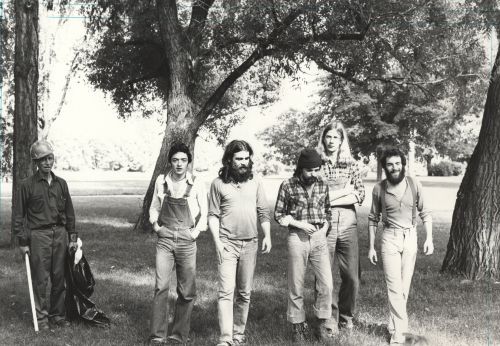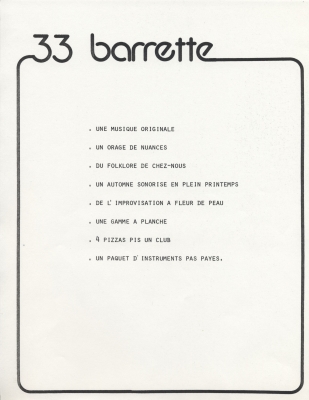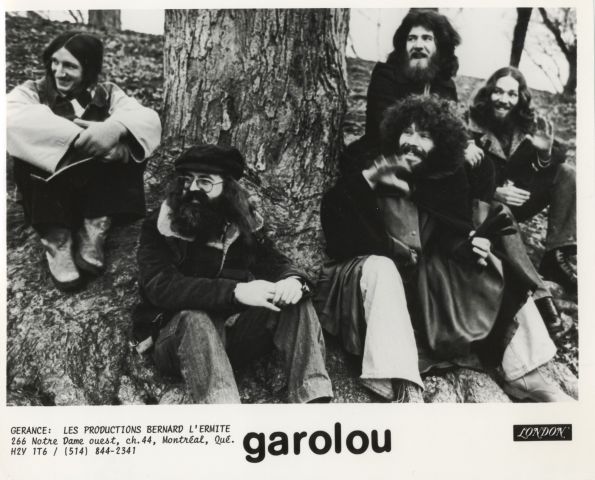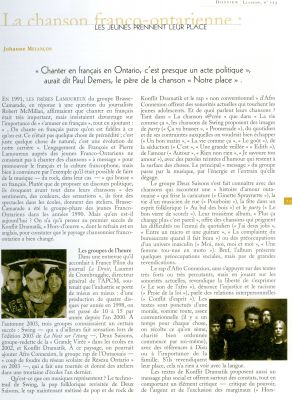French Ontario’s first “contemporary” songs come from the North, created for the play Moé j’viens du Nord, ’stie, and recorded by Robert Paquette. The founding of CANO – and its first performance, “Le Gros Show,” presented at La Slague, a Francophone cultural centre in Sudbury – is also associated with the origins of contemporary Franco-Ontarian music.
But Franco-Ontarian music also emerges further south, in the Ottawa region. An Ottawa group, 33 Barrette, for example, participates in Sudbury’s third annual Nuit sur l’étang festival in 1975. This event, already established as one of the main manifestations of Franco-Ontarian cultural vitality, makes the group one of the most popular in Ontario.
33 Barrette is composed of brothers Jacques and Robert Pariseau, Philippe Bâcle, Guy Devost, Claude Chevrier and Lise Pharand. The name of the group is actually the Vanier address where one of the Pariseau brothers lives. The group performs throughout French-speaking Ontario before splitting up in 1980, then coming together again later for a single performance. Its first album, Ça fait si longtemps, is released in 2003 and seeks to preserve the legacy of 33 Barrette by bringing together songs from its repertoire that speak of love and everyday life. The group is appreciated for its rich vocal harmonies.
Garolou, called Lougarou at the time, has more exposure in the region and beyond. Formed in part by brothers Bobby, Marc and Michel Lalonde, the group launches its first album in 1976, the year of the first Franco-Ontarian Festival in Ottawa. Garolou interprets songs from the traditional French and French-Canadian repertoire, but updates them to the flavour of the day, adding percussion and electric instruments.
This great period for Franco-Ontarian music, with Robert Paquette, CANO and Garolou as headliners, is followed by a certain silence. Then, singer-songwriter Paul Demers breaks this silence from the capital. Demers starts performing in the late 1970s, but it takes him some time to record his first album, Paul Demers, launched in 1990. His second album, D’hier à toujours, is released in 1999, followed by the third and last, Encore une fois, in 2011. Paul Demers succumbs to cancer in October 2016.
In March 2017, Queen’s Park designates “Notre Place” by Paul Demers as the official Franco-Ontarian anthem. Specially written to mark the coming into force of the French Language Services Act grand gala held in Toronto in November 1989, it creates quite a buzz. The lyrics relate to what was then, and still is now, the greatest mobilizing issue in French Ontario: language, as it brings together Francophones “of Pointe-aux-Roches or Orléans ... of Lafontaine or North Bay.”1
To no longer to have
To bite our tongue [...]
To put accents where they belong
We need to rise up, we need to celebrate ...
Our place
Today for tomorrow.
1 Paul Demers, “Notre place,” music by Paul Demers and François Dubé (translated from the original).
Franco-Ontarian music group, 33 Barrette [ca.197-?].
University of Ottawa, CRCCF, Fonds Association canadienne-française de l’Ontario (C2), Ph2-278.







